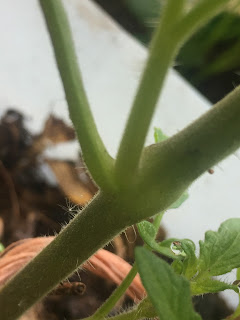I told you so...
The garden was pretty small this year but we seem to be getting what we want from it. We were not
angling for tons of produce, not this year, at least. This year was all about seeds. We are looking for lots and lots of seeds.
Still, we are looking at growth of a different type. Jans didn't believe me when I planted the seed in the ground and added a little water. He thought I was nuts even still when the seed poked out of the ground and developed leaves. When little nodes launched under those leaves and tendrils grabbed at things nearby his distrust turned to fascination. Jans is eight. This morning we found him in the garden, trying to explain to his little brother the difference between a cucumber and a pickle.
 It will be two years before his little brother will be in the 3rd grade, but the seed was planted. We have to make sure that this garden is here in two years though. We have to make sure that there are other gardens where other seeds can be planted.
It will be two years before his little brother will be in the 3rd grade, but the seed was planted. We have to make sure that this garden is here in two years though. We have to make sure that there are other gardens where other seeds can be planted.
Longevity is one of the primary problems with community and school gardens. Most schools do not have the budget to put in gardens so parents often have to step in. When parents step in then it is often the case that they find it interesting initially but as the heat sets in or their child moves on to the next grade, the garden is likely to lose support. All of this leads to a lot of skepticism the next go round. I could tell when some of the administrators rolled their eyes and thought, "another hippy who is going to come in and disrupt classes and disappear at the end of the year."
The key to any garden is sustainability. Kids see these garden at interesting times, sure, but the beauty of the garden is missed in a lot of cases as harvest times are during the summer when they are out or we have to work showing them parts of the life cycle that occur when it is cold outside. There are always things to learn in the garden but often we cannot get the learners to the garden. There is no greater thrill than telling a child, "I told you so."
Pamela Darhoten
Wanna contribute?
Want to follow on Twitter?
Want to follow on Instagram?
Want to email us? Thelifecooperative@gmail.com
angling for tons of produce, not this year, at least. This year was all about seeds. We are looking for lots and lots of seeds.
Still, we are looking at growth of a different type. Jans didn't believe me when I planted the seed in the ground and added a little water. He thought I was nuts even still when the seed poked out of the ground and developed leaves. When little nodes launched under those leaves and tendrils grabbed at things nearby his distrust turned to fascination. Jans is eight. This morning we found him in the garden, trying to explain to his little brother the difference between a cucumber and a pickle.
 It will be two years before his little brother will be in the 3rd grade, but the seed was planted. We have to make sure that this garden is here in two years though. We have to make sure that there are other gardens where other seeds can be planted.
It will be two years before his little brother will be in the 3rd grade, but the seed was planted. We have to make sure that this garden is here in two years though. We have to make sure that there are other gardens where other seeds can be planted.Longevity is one of the primary problems with community and school gardens. Most schools do not have the budget to put in gardens so parents often have to step in. When parents step in then it is often the case that they find it interesting initially but as the heat sets in or their child moves on to the next grade, the garden is likely to lose support. All of this leads to a lot of skepticism the next go round. I could tell when some of the administrators rolled their eyes and thought, "another hippy who is going to come in and disrupt classes and disappear at the end of the year."
The key to any garden is sustainability. Kids see these garden at interesting times, sure, but the beauty of the garden is missed in a lot of cases as harvest times are during the summer when they are out or we have to work showing them parts of the life cycle that occur when it is cold outside. There are always things to learn in the garden but often we cannot get the learners to the garden. There is no greater thrill than telling a child, "I told you so."
Pamela Darhoten
Wanna contribute?
Want to follow on Twitter?
Want to follow on Instagram?
Want to email us? Thelifecooperative@gmail.com


Comments
Post a Comment